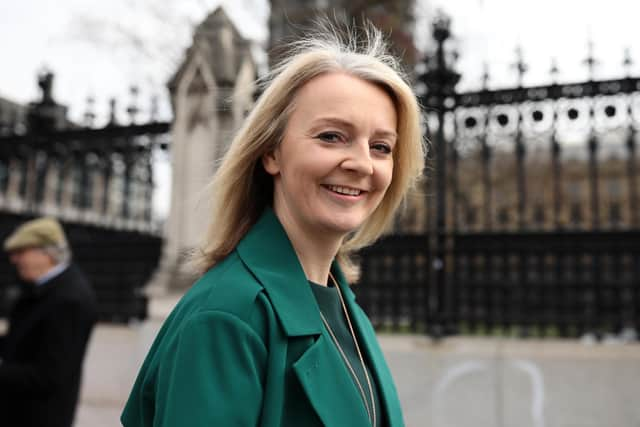Scotland's income tax rates are one reason the population is set to fall – John McLellan
Typical selfish Tories, opponents will say, but how many people look at the deductions on their pay slip with genuine satisfaction they are contributing to the greater good?
Plenty middle-class types consider themselves socialists who would agree tax should increase to improve public services, but if the usual target is big business and fat cats, however they’re defined, how many would agree they don’t pay enough themselves?
Advertisement
Hide AdAdvertisement
Hide AdA penny more for the NHS and that’s about it. And as Scottish Power boss Keith Anderson tries to persuade governments to adopt his plan to keep fuel bills down this winter, striking workers might argue he should cough up more of his £1.15m salary, while not batting an eyelid at the £1.5m earned by Celtic captain Callum McGregor.
One thing Messrs Anderson and McGregor have in common is they are indeed coughing up more than if they plyed their trade in England, in Mr McGregor’s case some £16,000 more. Of course, with a net monthly income of approximately £64,300 he won’t be worrying about his heating bills, but not so Scottish workers with earnings above £25,688 all taxed at a higher rate than England.
They need every penny to put food on the table once Council Tax and mortgage demands have been paid, and when National Insurance is included, earnings between £43,662 and £50,270 are taxed at a staggering 21p more in the pound in Scotland than in England, 54p against 33p.
If London Conservatives were cheering this week, their Scottish colleagues could only watch from more than geographical distance in a jurisdiction where the prevailing political presumption is people on relatively modest incomes can shoulder an ever-increasing burden.


When the Scottish Parliament’s tax-raising powers were expanded after the 2014 referendum, it was hoped the responsibility would focus the Scottish Government’s attention on all aspects of the choices it was making, whichever party was in charge, including economic growth and an understanding that a £43,000 salary while bringing up a family is not high-roller territory.
What the SNP thought was a big salary was badly out of date even before inflation shot into double figures, not when newly qualified train drivers earn £48,360 a year, police sergeants with five years’ experience £47,998 and similarly experienced chartered teachers pick up £49,989, all paying over £1,000 a year more income tax than their English counterparts.
Nor can any of them reflect philosophically that the cash grab is worth the resulting improvement in public services when they must deal with the opposite every day.
Meanwhile the gimmicky Scottish starter rate of 19 per cent gives the low paid a boost of about £1.75 a month which, according to new figures from Which? magazine, won’t cover the cost of running an average washing machine for a week.
Advertisement
Hide AdAdvertisement
Hide AdTinkering with income tax will make little difference to the energy crisis, and at least Liz Truss is now said to recognise tax cuts alone are insufficient, but reductions in devolved taxes put First Minister Nicola Sturgeon in a bind.
Reports yesterday suggested the Scottish budget will be brought forward to respond to the desperately needed UK emergency “mini-budget” expected this month, but with a Scottish Government response that “tax policy continues to be based on a fair and progressive approach”, no-one should get too excited.
At least National Insurance and VAT reductions apply UK-wide, but making a sustainable difference needs immediate reform of the energy markets, including giving the regulator Ofgem a well-deserved boot, and urgent domestic supply boosts, like the Sizewell nuclear announcement yesterday and new North Sea licenses.
But even if the SNP and avowedly anti-growth Greens were not dead against anything but wind power, it’s all too late for what’s coming this year. And as emergency funding plus tax cuts mean more borrowing, a UK Government-backed energy price freeze while the market is repaired, repaid by the energy companies over time, is a strong option.
Nationalising multi-national companies is for the birds, but without a proper business protection scheme, the billions spent on the Covid emergency programme will have been wasted and, as thousands of this year’s holidaymakers will testify, once jobs and services disappear it’s hard to get them back once conditions improve.
Whatever the UK Government’s plan contains, the Scottish economy faces an uphill struggle, with the Scottish Fiscal Commission (SFC) projecting average annual growth of 0.9 per cent over the next 50 years compared to the UK’s 1.4.
The British figure is nothing to crow about, but at least Liz Truss promises to prioritise growth, compared to a Scottish Government which appears to make a virtue out of anti-competitiveness.
The National Records of Scotland expects the Scottish population to peak at 5.48 million in 2028, then fall by 1.8 per cent by 2045, but the SFC predicts the rest of the UK will grow, and latest Office of National Statistics data shows total net immigration to June last year was up 239,000.
Advertisement
Hide AdAdvertisement
Hide AdWhile it suits the SNP’s pro-EU ambitions to blame Brexit for falling immigration, it’s not the UK but Scotland which has a problem; for all the Scottish Government’s claims about an inclusive, welcoming nation, aspirational Indians and Africans making a beeline to Britain aren’t looking north of the Border in any numbers, and policies which make Scotland a less attractive place to work must be part of the reason.
Fanning resentment can’t help either, but perhaps the softer language about Scotland’s place in the UK recently is recognition that bogus referendums and independence navel-gazing look more self-indulgent than usual during a crisis, but when First Minster Nicola Sturgeon presents her Programme for Government on Tuesday, no more taxes won’t be in the script.
Comments
Want to join the conversation? Please or to comment on this article.

